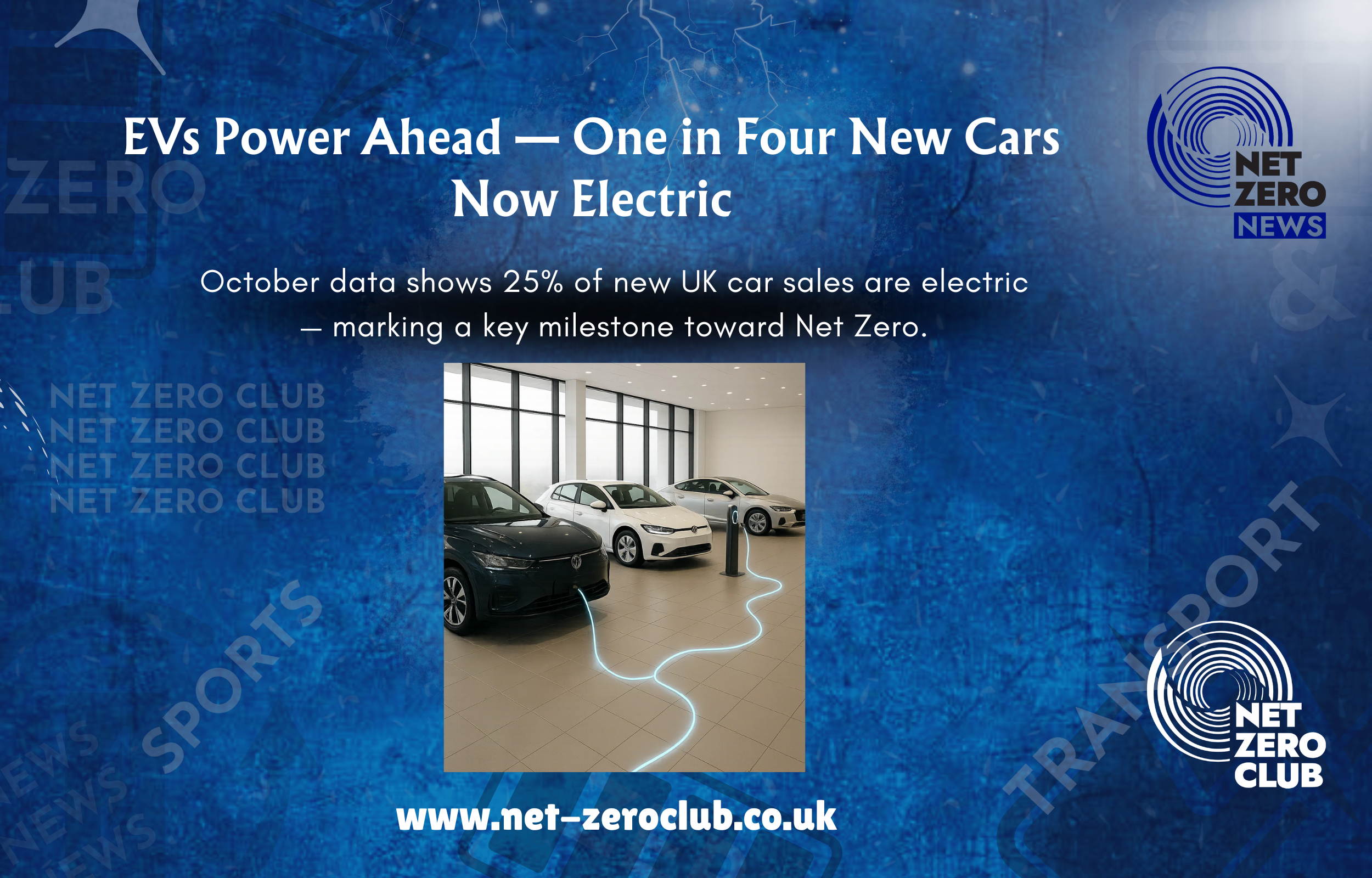October Sees EVs Capture 25% of New Car Market

Welcome, Net Zero News readers,
In a noteworthy development for the UK automotive market, October saw a stable performance, even with a slight dip in fleet registrations. The surge in battery electric vehicles (BEVs) has been a driving force behind this growth, marking a pivotal moment in the transition towards a greener future.
According to recent figures released by the Society of Motor Manufacturers and Traders (SMMT), overall new car registrations rose by 0.5% to reach a total of 144,948 units. This modest increase is particularly significant given that battery electric cars now command an impressive 25.4% of the market share, solidifying their position as a cornerstone of the new car landscape.
While registrations from larger fleets experienced a 1.5% decline, this downturn was counterbalanced by a 2.0% increase in registrations from private buyers. Notably, business registrations for sub-25 vehicle fleets soared by 32.7%, although this sector is often characterised by volatility and smaller volumes.
The standout performers in this market are clearly the electrified vehicles. For the second consecutive month, these vehicles accounted for the majority of new car registrations, comprising a remarkable 50.8% of the total market. This demonstrates a significant consumer shift towards sustainable transportation options.
Battery electric vehicles saw a formidable increase of 23.6%, equivalent to an additional 7,028 units being registered. This surge has allowed BEVs to secure a 25.4% market share, the second highest recorded this year. However, it is important to note that this figure still falls short of the 28% target set by the Zero Emission Vehicle (ZEV) mandate, although individual car manufacturers have their own targets to meet.
Plug-in hybrid vehicles (PHEVs) also experienced substantial growth, with a 27.2% increase in registrations, capturing 12.1% of the market. Similarly, hybrid electric vehicles (HEVs) posted a more modest growth of 2.1%, securing a 13.3% share of the new car market. In stark contrast, the demand for diesel vehicles plummeted by 22.9%, leaving them with only a 4.8% market share. Meanwhile, petrol registrations fell by 11.6%, now representing just 44.4% of the new car market, a notable decrease from 50.5% the previous year.
The upward trend in BEV demand becomes even more striking when observing the year-to-date statistics. For the first ten months of 2025, the overall BEV market has surged by 28.9%, totalling 386,244 units. This figure exceeds the total number of registrations for the entire year of 2024, with two months still remaining before the year concludes. Thus far in 2025, BEVs now constitute 22.4% of all new sales—a trend the SMMT attributes to substantial manufacturer investment and the introduction of the Government’s Electric Car Grant launched earlier this summer.
Forecasts for the coming years paint an optimistic picture for the automotive sector. The latest quarterly industry outlook anticipates that the overall new car market for 2025 will surpass two million units for the first time since the pre-pandemic year of 2019, estimated at 2.012 million units. It is projected that BEVs will make up 23.3% of this total. As for 2026, the overall market is expected to reach 2.032 million units, indicating a moderate improvement from previous forecasts, with BEV expectations remaining at 28.2%. While this reflects “exceptional progress,” it also means that BEV demand will still fall short of the mandated targets for 2026, which stipulate that zero-emission vehicles should comprise one in three new car registrations. The gap is projected to widen in 2027, with BEV market share anticipated to hit 32.2%, compared to a target of 38%.
In light of these developments, the SMMT has reiterated its call for government action regarding plans to end Employee Car Ownership (ECO) schemes. Announced in the 2024 Autumn Budget, the Government intends to impose company car tax on ECO vehicles starting April 2026. This initiative aims to close “contrived car ownership schemes” that exploit current arrangements, allowing car manufacturers and dealers to provide employees with discounted new cars that are then bought back to replenish used car stock.
The SMMT argues that these ECO schemes play a vital role in attracting top talent within the automotive sector by enabling employees to access the products they manufacture and sell affordably. They stated, “Government plans to impose company car tax on ECO vehicles would effectively lead to the closure of these schemes, making such vehicles unaffordable for the majority of workers and significantly reducing the influx of new, increasingly zero-emission vehicles into the market.”
Further, the industry body highlighted that approximately 100,000 cars are supplied annually through ECO schemes, accounting for about 5% of the annual new car market. The proposed government measures could “depress growth and severely impact the nearly new and used markets.”
In terms of economic implications, the SMMT estimates that more than £1 billion in revenue could be lost to the industry, placing 5,000 manufacturing jobs at risk. Additionally, the Treasury could face a £500 million deficit due to lost VAT and Vehicle Excise Duty receipts. The overall financial burden of these changes would exceed double the funds allocated to the Electric Car Grant, effectively negating the growth that the grant aims to stimulate.
Mike Hawes, SMMT chief executive, commented on the situation: “The Government has supported the UK automotive sector through EV incentives and global trade deals, which have driven growth and encouraged decarbonisation. However, abolishing ECOs would undermine this progress, penalising workers, diminishing Exchequer income, and jeopardising green investment. At a time when the Budget should stimulate growth, this measure would do quite the opposite. It is time for a rethink.”
As we delve deeper into the implications of these figures, industry leaders have emphasised the necessity for further support for electric vehicles to sustain sales momentum, particularly among private buyers.
Jon Lawes, Managing Director at Novuna Vehicle Solutions, stated, “Cost and charging remain the two significant barriers to widespread EV adoption. While we are making strides, the transition is still delicate. The UK is not yet on track to achieve the 300,000 public chargers needed by 2030, with access still heavily skewed towards London and the South East. For millions without driveways, charging remains a convoluted process—removing planning barriers to cross-pavement charging is a practical step that would make it as easy as parking on your street.”
He further added, “Affordability is another critical challenge. While extending grants to more models is beneficial, the majority of buyers are focused on used cars, a market that remains largely overlooked. Without targeted incentives for used EVs and expedited commercial charging solutions, adoption across both cars and vans will continue to lag, particularly with van decarbonisation struggling to meet the UK’s 16% ZEV target.”
Nick Williams, Managing Director at Lex Autolease, echoed similar sentiments: “The momentum in the EV market is undeniable, with more drivers realising the financial and environmental benefits of switching to electric. The figures from October underline the progress we have made, and with the Government’s plans to simplify and reduce costs for home charger installations, transitioning to electric has never been easier.”
Williams added, “To maintain this positive trajectory, the industry must keep pace by supporting all areas of the EV market and addressing lingering misconceptions about EV ownership.”
James Hosking, Managing Director of AA Cars, also weighed in: “Fleet sales continue to be the backbone of the EV market, yet it is encouraging to see private buyers following suit. Clearly, incentives are having the desired impact—drawing more individuals into the market and helping to alleviate some of the affordability concerns that hampered growth earlier this year.”
He concluded, “This strength in the new car market is also having a ripple effect on the used car sector. As an increasing number of EVs enter the second-hand market, consumers have access to a broader array of models at more affordable prices. Our latest Used Car Index indicates that many used EVs have become significantly cheaper compared to last year, thus opening up opportunities for more motorists to transition to electric without the financial burden of purchasing a brand-new vehicle.”
Finally, Jamie Hamilton, Automotive Partner and Head of Electric Vehicles at Deloitte, remarked, “Consumer demand for EVs is evident; however, sales are being stifled by inadequate charging infrastructure. To ensure a level playing field between electric and traditional petrol and diesel vehicles, further investment in infrastructure is essential. As more EV brands enter the UK market and consumers are presented with a greater variety of choices, this investment becomes increasingly crucial.”
As we reflect on these developments, it is evident that the journey towards a net-zero future is gaining momentum, driven by the increasing adoption of electric vehicles and the need for supportive policies and infrastructure. The automotive landscape is evolving, and the synergy between government action, industry innovation, and consumer demand will be pivotal in achieving our collective climate goals.

 Got net-zero news, project updates, or product launches to share?
Got net-zero news, project updates, or product launches to share? 
